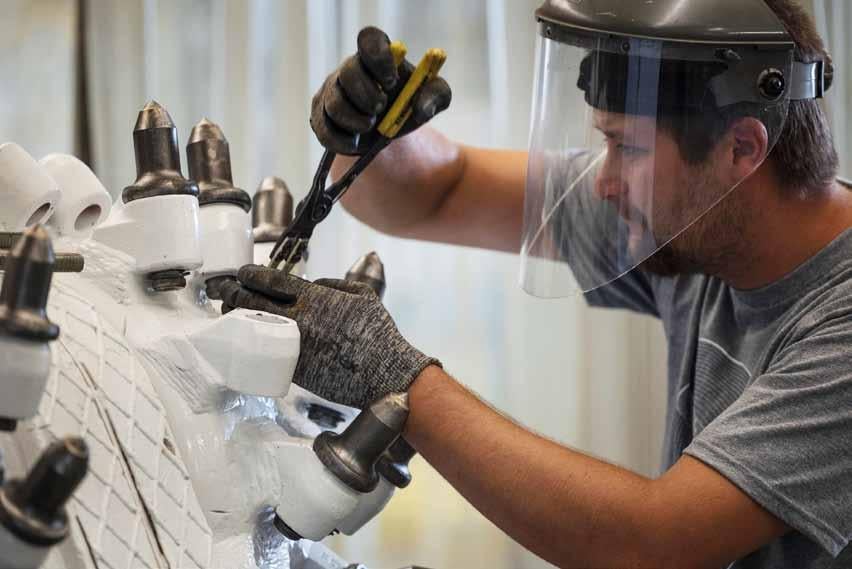
4 minute read
Helping your kids to cope when you work away
By the Mining Family Matters team
A major issue for every FIFO family is ensuring the kids don’t miss Mom and/or Dad too much, or become overly anxious when they’re away at the mine site. The first thing to remember is that it’s entirely normal for children to miss their parents – it’s a good sign that the relationship is strong and healthy. Child anxiety is a slightly different matter. While still normal, anxiety is worrying for parents and could become distressing for the entire family if it’s not properly handled. Symptoms of child anxiety range from a slight feeling of discomfort (butterflies in the tummy) to intense feelings of fear and panic. Behaviours could include excessive crying and clinging; repeated difficulty in sleeping or waking in the night; talking excessively about a particular concern; difficulty settling into play; repeating certain behaviours; headaches or tummy aches; appearing to ‘go backwards’ in development; disinterest in activities or people; excessive shyness. If your child is missing Dad and/or Mom and feeling sad, or showing more worrying signs of anxiety, the following suggestions might help: • Allow your child to talk about it, and offer an extra cuddle when they’re feeling sad. Try to avoid saying things like “be brave” or “don’t be silly” because your child might begin to hide feelings away from you, thinking that you are not interested or that they are unacceptable feelings to discuss.
After a cuddle, try asking “can you think of anything that might help you feel a bit better?” If nothing comes up, suggest things like writing a letter to Mom or Dad, drawing a picture, watching TV, going out for play, cooking, or another sort of enjoyable activity. This tells your child that feelings can be talked about, and also that there are things you can do to help yourself feel better and take your mind off sad thoughts. • Think back to when your child began to have trouble coping, and try to remember if anything else changed around that time (visitors leaving, starting school, illnesses, or accidents). if so, try asking for their feelings about it. Here’s an example: “I’ve been thinking about how upset you’ve been getting and I’ve noticed that you started to cry more often around the same time as your brother starting daycare. Did you feel sad or worried about that?” This gives children some context and helps them to understand the sorts of things that might contribute to their feelings. Don’t assume what’s
worrying your child or put words into their mouth – just ask. • Try also asking “what upsets you about Daddy or Mommy going away?” It sounds obvious, but sometimes we forget to be direct. This shows that you’re interested in what’s happening – and they might even be able to clarify their fears or worries for you. You can then offer clear and truthful answers, instead of vague assurances. For example, if your child is worried about Mom or Dad’s safety, he should discuss (and show if possible) all the equipment that is worn/used for safety rather than just saying “i’ll be fine”. • Never talk about Dad or Mom “going away” or “leaving”. it should always be “going to work”. They’re just words, but children take things very literally. By the age of four or five, most children have the capacity to (sort of) understand that people work to get money and that money is necessary to buy things like food and clothes. Also show your child a map to explain how far away the work site is – this shows that they have no choice but to stay away. • Maintaining a connection is very important. Phone calls, letters, and cards will ensure your child knows that Mom or Dad is thinking of them. When Dad or Mom is home, they could perhaps make a special bracelet, card, book or other object as a reminder of their bond. Something pocket-sized is great – even just a little card with a special note – because it can be carried around and treasured every day. On a final note, sometimes children ‘wear’ the anxiety of their family. Are the rest of you coping OK with the current roster? Do you have any worries or concerns that occupy your thoughts when your partner is away? Talking or thinking through your own concerns or worries can indirectly help your child to cope. since 2010, Mining Family Matters has provided professional, practical advice to miners and their families around the world. in Canada, 32-page printed guides helping mining families to survive and thrive are available for companies in English and French. For information and further expert advice on careers, mental health, relationships, and parenting, visit the Mining Family Matters website at www.miningfm.com.










